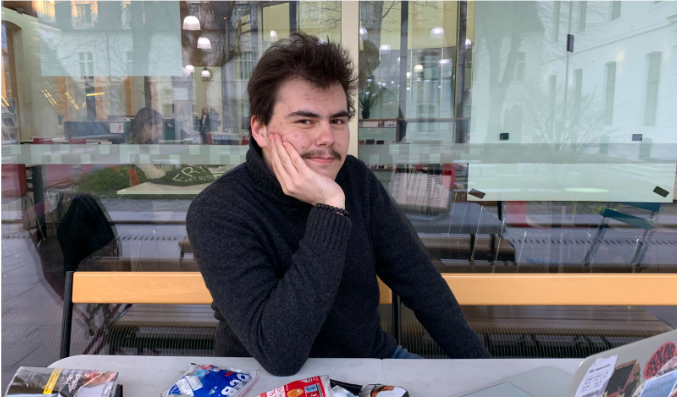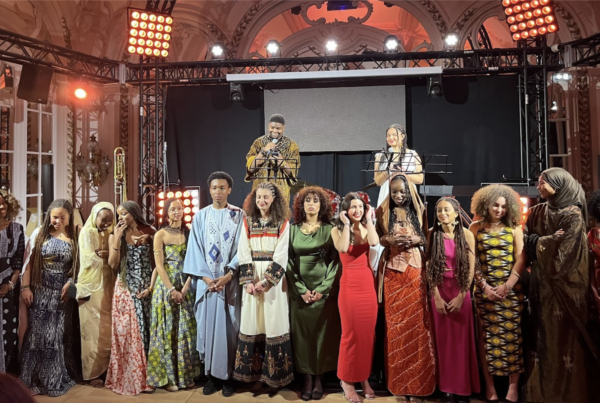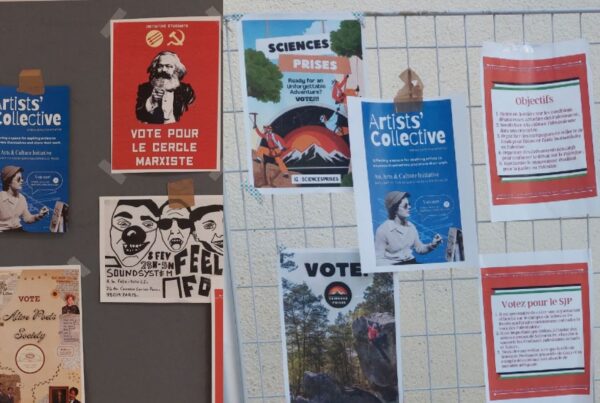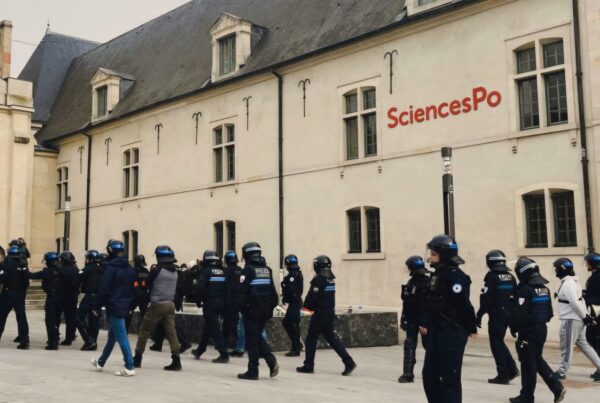If there is one certain thing at Sciences Po, it is Sámuel Vető at his desk, in front of the library. Students have, for more than a year now, enjoyed his company, listened to his wise insights, poetry, and never-ending philosophical thoughts. But what is his agenda? Who is Samuel? What does he think about his time in the courtyard?
Máté
So first of all, I wanted to ask how we should call you? Sam, Samu, Samuel?
Sam
Knowing how many names I already go by, I think it can be established that any and all forms can be applied. Sam, Samuel, Sammy Boy, Samu, Sham. Just plain sham. This whole act is a sham. There you go.
Máté
Can you tell me a bit about what you think your role has become here?
Sam
The problem with this whole arrangement is that even I sometimes lose track of what it is. I could, for example, cast a history of this thing. But we’re talking about what this is at this particular moment in time. So, I say that this operation of mine is going to be about a certain sense of communion or community. This is what I would like to establish, lay down, and somehow just set in stone.
Máté
Do you know how it started? Or has it just happened gradually?
Sam
It was a … complicated process. When I first came to Sciences Po, I was just as dazzled and somehow still a little bit forsaken as everybody else. I vividly remember that after we had the first history lecture with Professor Piketty [during 1A], I sat down on one of the benches. It wasn’t the bench that I have now, the one that is a little bit wider with black undergirdings; it was a lighter one. The rain started coming down, so everybody flocked in from the courtyard. And I just remember being a little bit entertained by this whole affair. So, I decided that until the weather turns a little bit more morose I’m just going to stay out and enjoy what little time I have left in nature. This is how it started out.
Later on, it became more and more complex because of course I stayed out even during winter. I had to justify that particular thing in some senses. It’s nice to [consider] how this whole thing that somebody just does for no reason whatsoever can still be given a sort of underhanded meaning.
Máté
What kinds of conversations do you enjoy the most?
Sam
I cannot possibly decide because there are as many conversations as there are people who surround me. And it’s a little bit difficult to just create some sort of intelligible space in this whole affair which I’m constantly getting caught up in. I could name people with whom I’m really getting along. I could maybe even group them.
We have, of course, those people who visit me the most. Many times, they are the ones who are just passing by. The current first year students among them, for example, Patriks, Joaquin, Lunyan, Noa, Laura, Yamen, Jasmine, and Mona. These are the people who come up to me. Sometimes they tell me about their fresh experiences. Maybe they are fetching for something a little bit more deliberate. Perhaps they are trying to chart something of a plan or routine. It’s those types of conversations where you sit down with them and listen to their insights. Somehow you try and provide them with something more of a leverage.
Then I have those types of conversations, which are a little bit more jittery. This is when I get to experiment with stylistics a little bit. For example, people such as Sesilia, Ana, Eren, Vess, Ash, Léa, Pranas, and Chiedza, sometimes even Vija, visit me and many times it’s about a whole degree of topics. But other times, it’s about how this type of humour that is sometimes contained in conversation can be stretched out even more. I like these types of affectations that they make and it’s really nice to have these smaller things.
Then I have the conversations with my own people, the Hungarians, one of whom happens to be sitting opposite me. It’s funny because it takes me home a little bit. I see these chances of being able to sometimes expand on what I can actually do with my own language, with my own native tongue. It takes another shape. We’ve even known each other for a little bit longer [as we met before Sciences Po.] Of course, being assertive with each other is a whole lot easier because it’s going to be in a setting which we could, for example, practise perfectly elsewhere. But now there’s just this liminal space where it always is a funny concept. People hear this type of bizarre language that touches their ears in a really awry way. It’s like having this secret group.
But I think the most elaborate, the most deeply-striking conversations that I had with people were really with the Americans and the Italians. I could say that if they have contributed to me trying to weave the meaning of the table a little bit more intensively, then their effort was tantamount to that. And I could say of course a couple of names. Among the latter, Emanuele, sometimes Roberto, but we have not been speaking all that much [lately]. We generally also have Lucius, Gaël, Loolie, and the people from Stuart (last year’s BDA counterlist). Anna and Boas are the two German people who are also in this group somehow. Then we have Ludie, Rich, Remy, and Tom sometimes. We also have Xuan and sometimes Susan. And Pedro, of course. They are the people who visit me the most and with whom I can connect on a deeper level. That of course does not exclude anybody else. It’s just that they are the ones who appear the most commonly.
Máté
Do you think that this brought you closer with more people?
Sam
I think it has had explosive effects. I think it might’ve had something to do with my own understanding of myself as somebody who was something of a recluse. When you are reclusive, you have this type of thing where you’re forcibly withdrawn from somewhere. It becomes a little bit harder for you to somehow penetrate into that space where you can actually be more social than through the surreptitiously natural process of socialisation. And I see that this effort of mine, which has not necessarily been done for those reasons which now I understand them to be, has led me to discover many really eccentric people. Especially with the 1As, this type of thing that I practice became even more established. It dazzles me to this day.
Máté
Do you focus on students or do staff members and teachers also find you?
Sam
This is by and large a space for us, for students. Because this is what I like to somehow provide in an understanding of student life. I would say that, the majority of times, the emphasis is laid upon the students who I am together with because of course I’m also one of them. It should be logical that this very decentralised and mobile environment that is Sciences Po, where everybody constantly has to relocate somewhere, where everybody’s searching for some modicum of a place where they can set themselves down, is something that has to be affirmed. After a time, once I recognised these patterns being more and more intensive, I saw more and more that this is a perfect place where this type of communion, where this type of “being-in-the-world” or “openness to being”, to borrow a term from [Martin] Heidegger, could somehow be buttressed. People can freely let their voices be heard in the discovery of their being without being immediately shut off. This is something I stand by.
Recently, I had this rare opportunity that a very well-regarded teacher sat down beside me just to talk, just to have a little bit of a chat and smoke. It was Omar Mohammed, the teacher who’s currently teaching the counter-terrorism module. It was magnificent. He’s extremely intelligent. Very, very knowledgeable on this topic. He successfully made [that] explicit in that 10 minutes we have spent together. And what he used as an excuse to sit down beside me is that he presumed that this was the smoking place because he could not stand the teacher-designated areas. I mean, everybody has their own reasons, but who knows! This might be a sign of something else. Sometimes teachers visit. Sometimes they look at me, do not necessarily sit down, but just have a little chat.
Máté
What do you get out of all this? What do you enjoy about it?
Sam
I enjoy being provided with a constant flow of possible situations to insert myself into. This is rather something akin to a strange versatility that I see in people. But, I would not like to phrase this whole thing as me using all of these different people as a means. I really, really do believe that if there’s any moral standpoint from which I should be approaching this issue, it’s that people are ends in themselves. I should be treating them as ends, as specific, purposive beings who have their own type of little understanding of the world. Beings who have their own subjectivity around things, and who, in some ways, would be able to and are able to enunciate things which have an interesting novelty around them. On the other hand, when I’m affected by these things I’m always beset by this little private joy that I feel in these environments. Because I look at these people, and I see people to admire, people to look at. People to contemplate. And it’s not just the thoughts themselves which interest me, it’s their whole disposition, their whole appearance. It’s how they project themselves. It becomes this huge polysemous network of different potentialities. This is something that I always liked about this place.
Máté
Would you like to pass on your role here as you leave the campus in May? Or is that even possible?
Sam
I do not know whether that is possible. It’s an idea that confounds me a little bit. Finding a successor would be an interesting thing to do. But I do not know how people succeeding me would be able to carry out this operation by themselves. The whole point about this thing that I’m doing is that it is supposed to be signalling something that Hannah Arendt has called “isonomy”, a place of no-rule which presupposes that there is no preliminary institutionalisation to this one single form. It has to be understood as an operation that I carry out because I like it being carried out. Somehow, we managed to provide this type of meaningfulness to it. This is rationalised in so many different ways.
I do have my own godsons and goddaughters [among the 1As] in a way. I think the best that I can do is maybe select one of them. But in all fairness, the best possible way to conduct this whole thing is to have them all inherit it. And maybe, just maybe, to create something new out of it. It should be a good idea to not necessarily immortalise this thing…
Provided this type of novelty that I see in things, which we all see in a way, no day is the same at Sciences Po.
The interview was conducted on January 30, 2025.
You can read the interviewee’s guest submission here.
Other posts that may interest you:
Discover more from The Sundial Press
Subscribe to get the latest posts sent to your email.






Why isnt paupau mentionned?????
Why isnt paupau mentionned????? samuel, this is an OUTRAGE!!!!!!!!
i really didn’t like it because he did not mention pauline colombani
samuel wrote a whole article and didn’t say `’pauline” once––– FAKE INTERVIEW